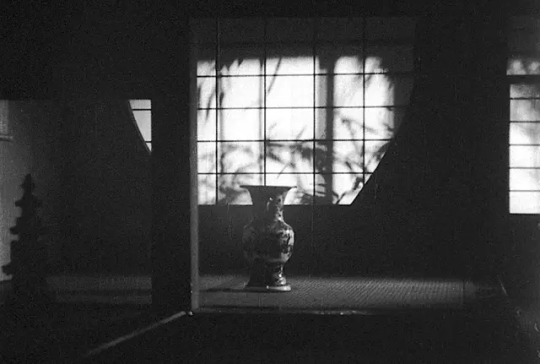#this is actually the second transcendental ending we got in BL this year
Explore tagged Tumblr posts
Text
The On1y One and the Queer History of *Poetic Cinema*


Still thinking about the ending of The On1y One, because that last shot of the pitcher is a clear reference to one of the most discussed shots in cinema history. Just look up "Ozu vase" and you'll see a plethora of written and video essays speculating on the meaning of it. The Japanese director Yasujiro Ozu cut to it in the midst of a climactic conversation in the film Late Spring between a father and daughter about her arranged marriage. Nerdwriter, in one of their better video essays, does a solid run-down of the discourse.
youtube
The shot is used as one of the prime examples for Paul Schrader's absurdly significant theory of Transcendental Style in Film. This style is what non-cinephiles will refer to as what's boring, confusing, and pretentious about Art House movies, and they are boring, confusing, and pretentious--intentionally so! When you see the "Poetic Cinema" meme, it comes from the director Andrei Tarkovsky as he's talking about his idea of sculpting time in cinema which is akin to this.
In the video below, Schrader describes, "If you consistently withhold and now the viewer is leaning toward you, now you have to, in a certain moment, free them--do something unexpected."
youtube
Freedom, in these instances, is not achieved through the happy ending. It's a spiritual release achieved by breaking the rules and patterns of the established reality.
Not enough is written about the queerness of Ozu and his films (including the possible Boston marriage situation of his muse, Setsuko Hara). Luckily, the some solid pieces exist, and Ozu would be an awesome place for anyone interested in asexual queer practices in film to look at. He's often held up as a symbol of conservative Japan, but his stories about the familial pressures and anxieties of heterosexual marriage and his formal strategies that allow people, if not physical escape, at least spiritual release from the bounds of societal expectations are quite radical.
The On1y One evoked Ozu's spiritual resistance to condemning limits throughout its series and in its final image. The conservative culture of families, marriages, economics, and schooling had locked all these queer men into psychological cages that isolated them and caused them to neglect their own feelings and others. Without fast-forwarding time or writing a fantasy, how can the series free them? The poetry and human-less pillow shots throughout have clued us into an experience of the world bigger than oneself. That final image is the culmination, transcending tragedy, abandonment, and death for a much queerer dream of eternity.

#the on1y one#yasujiro ozu#late spring#this is actually the second transcendental ending we got in BL this year#after love for love's sake#but that one aligned more with the BL tropes of beach episodes and 'must have a happy ending'#and also had the idea of transcendence be the more familiar concept of transcending in the after-life#we also had the wonderfully ambiguous ending of Only Friends#I'm just loving this era of BL series tbh#it was made for my pretentious ass#you're also gonna see these transcendent endings in the super queer 90s anime#Skam is another influential series for BL fans that goes for a transcendental ending#Youtube
22 notes
·
View notes